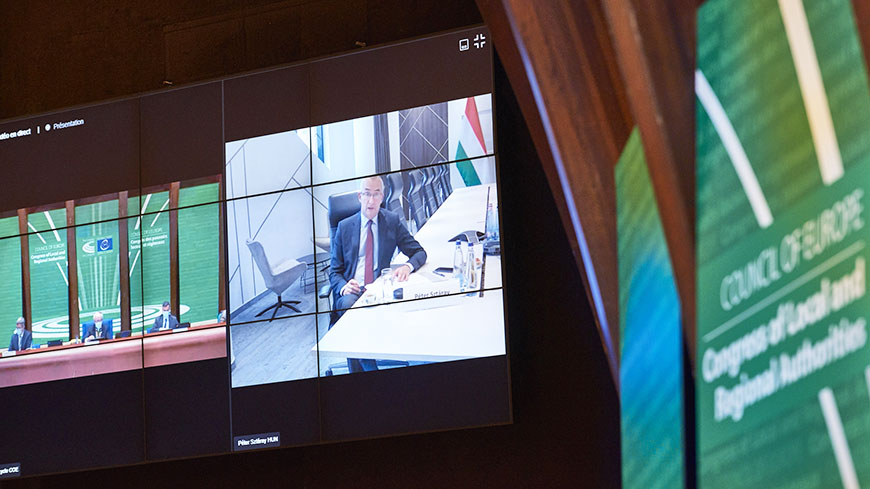On the second day of the 41st Session, Wednesday 27 October 2021, the Congress adopted reports on local self-government in Cyprus and North Macedonia. The report on Cyprus was presented by Gunn Marit Helgesen (Norway, EPP/CCE) and Marc Cools (Belgium, ILDG). The debate was followed by an exchange with Cyprus Minister of Interior Nicos Nouris. Zdenek Broz (Czech Republic, ECR) and Harald Bergmann (Netherlands, ILDG) presented the report on North Macedonia, which was followed by a statement by Deputy Minister for Local Self Government of North Macedonia, Zoran Dimitrovski, who also replied to questions from the floor.
Congress members held a debate in the plenary on “Covid: the road to recovery?”. It sought to tackle pressing issues at stake in European cities and regions: how can societies recover from the crisis while the health situation seems to stabilize in many European countries? OECD Deputy Secretary General Ulrik Vestergaard-Knudsen stressed the heterogeneity of the economic and social impact of the pandemic among regions. CEB Appointed Governor Carlo Monticelli underlined the role of local and regional authorities as "precious allies when it comes to delivering high impact social investments to communities most in need".
Local and regional elected representatives throughout Europe have been faced with the rise of fake news and hate speech in recent years, particularly on the Internet and social networks. As such, a thematic debate was organised by the Chamber of Local Authorities to determine which responses should be enacted and what tools should be developed to tackle the challenge of fake news and hate speech. The project will explore means of detecting these phenomena and possible legal and technical action against them. At the opening of the sitting President of the Chamber of Local Authorities, Bernd Vöhringer, drew attention to the increase of hate speech and fake news on the internet and the impact of these negative phenomena on the working environment of mayors and councillors.
In the plenary, the State Secretary responsible for Security Policy of Hungary, Péter Sztaray, underlined the key priorities of the Hungarian Presidency: artificial intelligence and digitalization, the protection of national minorities, environmental issues, antisemitism, and youth issues during his speech to the Committee of Ministers.
On the same day, the Chamber of the Regions debated inter-regional and cross-border co-operation for better territorial integration in the context of the Covid-19 pandemic. The Congress called on members States in particular to make use of Protocol No. 3 of the Madrid Convention which constitutes a legal basis for cross-border co-operation in Europe. The Congress also called for special legal provisions for “transborder communities” having a legal status, in order to overcome the obstacles created by the different legal regimes on either side of the border, as well as for strengthening cross-border governance and “horizontal subsidiarity” through the transfer of operational competences and resources to transborder communities.
The Chamber of Regions also discussed the challenges to expand professional education and lifelong learning for young people at the regional level, shared measures and best practices to remedy these issues, and considered what further action the Congress desires to take on this suject. This was achieved through a debate on the lifelong education to ensure/secure lifelong employment perspectives for young generations, a challenge for the regions.
Members of the Chamber further explored the role of relations with diaspora communities as a contribution to regional development and regional mechanisms for engaging diasporas to foster commercial and cultural exchanges, attract foreign investment, facilitate technology and knowledge transfer, and seize other socio-economic benefits from the links with diaspora during its third debate on Wednesday morning.
At the opening of the sitting, the President of the Chamber of Regions, Harald Sonderegger, called for a re-decentralisation of competences and resources to regions and their better distribution with an improved system of multi-level governance. This follows the fact that during the Covid-19 crisis, many competences were recentralised to the national executive and many decisions were taken without proper consultations with regional authorities – despite the multi-level governance proving to be more effective and flexible in responding to the pandemic, when it was used.
Also on the agenda was the Dosta!-Congress Prize awarded to Municipalities from Portugal, Greece and the United Kingdom for initiatives aimed at integration of Roma and Travellers. First place went to the Portuguese municipality of Torres Vedras, which came up with a unique plan enhancing cohesion between local communities and Roma. The second place was awarded to Greek municipality of Argostoli for improving living conditions of the Roma community, attendance conditions for children in schools, as well as for providing housing and health care support to Roma population on Kefalonia island. British Salford won the 3rd prize for implementing an educational exhibition.
The Chamber of Local Authorities elected John Warmisham (United Kingdom, SOC/G/PD) and Oksana Derkach (Ukraine, EPP/CCE) as 6th and 7th Vice-President, respectively.
Videos of the debates: Plenary Session | Chamber of Local Authorities | Chamber of Regions
*** 41st Session of the Congress ***
Agenda- Documents : ENG | FRA | DEU | ITA | RUS
41st Session webpage: live broadcast, photos, videos and useful links




